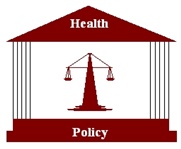Health Equity – Health in All Policy

Health in All Policy (HiAP), first drafted by the World Health Organization, is an innovative approach to add health issues and concerns to the process through which government policies are created and implemented; such as the design and implementation of sidewalks and crosswalk lights during road and building construction to allow individuals to safely reach their destinations. This particular process allows individuals without transportation access to healthy foods, green spaces, and medical facilities in a safe and expeditious manner, while also promoting physical activity. The ultimate goal of HiAP is to educate decision-makers to increase awareness of the health implications of all policies—not just those explicitly related to health.
There are a number of projects currently being carried out within the Division of Public Health that promote the HiAP vision. For example:
-
Health Impact Assessments – HIAs can help policymakers identify unintended health risks, reduce unnecessary
costs, find practical solutions, and leverage opportunities to improve the well-being of communities.
- You can find many programs involved in HIAs throughout the Division, such as: Bureau of Health Equity, Delaware Healthy Eating and Active Living, Maternal Child Health, and Office of Performance Management.
-
Innovations in Public Health Policy Competition – The competition is designed to solicit innovative ideas from
multiple offices within the CDC that NNPHI members then respond to with policy intervention proposals. The NNPHI members help support
the initiatives while being implemented. This competition fosters greater awareness of policy as an intervention to support public
health goals, inspire cross-agency collaboration within the Center for Disease Control, and promote National Network of Public Health
Institutes’ member establishments as viable partners. The National Network of Public Health Institutes (NNPHI) improves public
health outcomes by fostering innovation, leveraging resources, and partnering with government agencies, communities, the health care
delivery system, media, and academia. PHIs address current and emerging health issues.
- The Division of Public Health has been engaged in NNPHI initiatives and learning since February 2006.
-
Agricultural Policy As a Means to Promote Health – This policy extends issues of healthy nutrition into a
broader perspective of agriculture and food systems. Agricultural organizations; such as local farms and city wide civilian
organizations as well as state agencies; such as Public Health and DNREC, will gather to conduct policy research and analysis projects
on food systems and health.
- Such organizations as Delaware Farmer’s Markets, WIC (Women, Infants, and Children), United Way of Delaware, and the Food Bank of Delaware promote healthy eating by means of Delaware’s home grown produce.
For more information on Health in All Policy, please visit:



